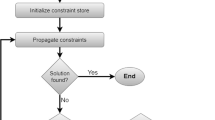Abstract
This paper investigates a difficult scheduling problem on a specialized two-stage hybrid flow shop with multiple processors that appears in semiconductor manufacturing industry, where the first and second stages process serial jobs and parallel batches, respectively. The objective is to seek job-machine, job-batch, and batch-machine assignments such that makespan is minimized, while considering parallel batch, release time, and machine eligibility constraints. We first propose a mixed integer programming (MIP) formulation for this problem, then gives a heuristic approach for solving larger problems. In order to handle real world large-scale scheduling problems, we propose an efficient dispatching rule called BFIFO that assigns jobs or batches to machines based on first-in-first-out principle, and then give several reoptimization techniques using MIP and local search heuristics involving interchange, translocation and transposition among assigned jobs. Computational experiments indicate our proposed re-optimization techniques are efficient. In particular, our approaches can produce good solutions for scheduling up to 160 jobs on 40 machines at both stages within 10 min.
Similar content being viewed by others
References
Bellanger A., Oulamara A. (2009) Scheduling hybrid flowshop with parallel batching machines and compatibilities. Computers and Operations Research 36: 982–1992
Centeno G., Armacost R. L. (2004) Minimizing makespan on parallel machines with release time and machine eligibility restrictions. International Journal of Production Research 42: 1243–1256
Dobson G., Nambimadom R. S. (2001) The batch loading and scheduling problem. Operations Research 49: 52–65
Grangeon N., Tanguy A., Tchernev N. (1999) Generic simulation model for hybrid flow-shop. Computers and Industrial Engineering 37: 207–210
Hung Y. F. (1998) Scheduling of mask shop E-beam writers. IEEE Transactions on Semiconductor Manufacturing 11: 165–172
Hunsucker J. L., Shah J. R. (1994) Comparative performance analysis of priority rules in a constrained flow shop with multiple processors environment. European Journal of Operational Research 72: 102–114
Kashan A. H., Karimi B., Jenabi M. (2008) A hybrid genetic heuristic for scheduling parallel batch processing machines with arbitrary job sizes. Computers and Operations Research 35: 1084–1098
Kuo Y., Yang T., Peters B. A., Chang I. (2007) Simulation metamodel development using uniform design and neural networks for automated material handling systems in semiconductor wafer fabrication. Simulation Modeling Practice and Theory 15: 1002–1015
Li C. L., Lee C. Y. (1997) Scheduling with agreeable release times and due dates on a batch processing machine. European Journal of Operational Research 96: 564–569
Malve S., Uzsoy R. (2007) A genetic algorithm for minimizing maximum lateness on parallel identical batch processing machines with dynamic job arrivals and incompatible job families. Computer and Operations Research 34: 3016–3028
Mathirajan M., Sivakumar A. I. (2006) A literature review, classification and simple meta-analysis on scheduling of batch processors in semiconductor. International Journal of Advanced Manufacturing Technology 29: 990–1001
Petroni A., Rizzi A. (2002) A fuzzy logic based methodology to rank shop floor dispatch rules. International Journal of Production Economics 76: 99–108
Potts C.N., Kovalyov M.Y. (2000) Scheduling with batching: A review. European Journal of Operational Research 120: 228–249
Uzsoy, R., Church, L. K., & Ovacik, I. M. (1992). Dispatching rules for semiconductor testing operations: A computational study. IEEE/CHMT International Electronic Manufacturing Technology Symposium (pp. 272–276).
Author information
Authors and Affiliations
Corresponding author
Rights and permissions
About this article
Cite this article
Wang, IL., Yang, T. & Chang, YB. Scheduling two-stage hybrid flow shops with parallel batch, release time, and machine eligibility constraints. J Intell Manuf 23, 2271–2280 (2012). https://doi.org/10.1007/s10845-011-0571-z
Received:
Accepted:
Published:
Issue Date:
DOI: https://doi.org/10.1007/s10845-011-0571-z




